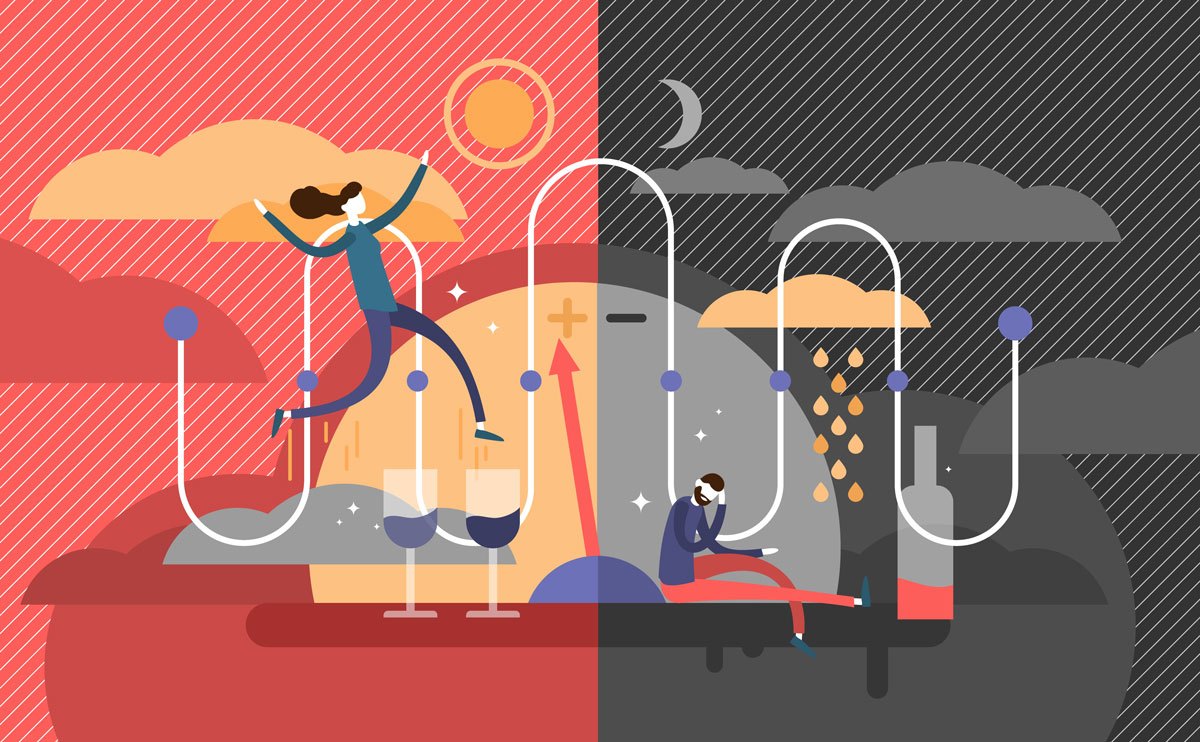Most people think of bipolar disorder as periods of high energy or “mania” followed by periods of depression. However, bipolar anger is a common phenomenon among those living with this disorder, and controlling it can be a challenge. Learn more about how to cope.
Most people have moments where they lose their temper, perhaps even to the point that they say or do something that they regret. For those living with bipolar disorder however, anger can be a regular and volatile emotion that may feel uncontrollable at times, affecting both the person experiencing it as well as those around them. Understanding why anger occurs in bipolar disorder, and how to help manage this emotion, can improve the quality of life and relationships of those living with this condition.
What is Bipolar Disorder?
There are four clinically-recognised types of bipolar disorder, all of which are commonly characterised by a person experiencing periods of depression, mania or both. Depending on the type of bipolar disorder someone has, some people living with this condition will cycle through these states, moving from mania to depression or vice versa, while others will be more affected by depression, and still others will have more mild shifts in mood.
Most people with a bipolar disorder will show signs in their teens and early 20s, and nearly everyone will develop it before the age of 50. People who have an immediate family member with bipolar disorder have a greater chance of developing it themselves.
How is Anger a Part of Bipolar Disorder?
Anger isn’t generally considered a symptom of bipolar disorder, but is commonly experienced by people who have the disorder, especially if they are not receiving treatment. What is often described as irritability can escalate into anger and even rage. Anger may come on during a manic episode, but can also be experienced at other times, such as if mood swings are rapid or severe. Anger can also be self-directed, particularly during depressive episodes.
Knowing what uncontrolled anger is
Anger is a normal and healthy reaction to situations where we feel offended, hurt or outraged. However, anger becomes problematic when the expression of it alienates someone from people that they love, or causes harm to oneself or others. This is a sign that professional help is needed in order to manage angry outbursts and protect relationships with others.
If you are not sure whether your anger is uncontrolled, try asking yourself a few questions like:
- Do my friends and family back down or remove themselves from an argument instead of engaging with me?
- Have I had problems at work due to my issues with anger management?
- Do people avoid me, or have I lost friendships over my anger?
If you have answered affirmatively to these questions, this is an indication that your anger goes beyond your control.
Actress Linda Hamilton and her experience with bipolar anger
Award-winning actress Linda Hamilton is perhaps best known for her compelling portrayal of the strong, resilient character of Sarah Connor in the Terminator movies. In 2004, she shared her experiences with bipolar disorder with the Associated Press, including those of bipolar anger:
If I was suffering or angry with my husband over the smallest slight, he would suffer. And if we happened to be with his brother and sister-in-law, they would suffer. There was no capacity to remove myself from my condition and think about other people in the room and how they might not want to have to be dragged into this, so it was all about me…
A lot of the raging that I did I think was the manic part of my disorder. The capacity for fighting, war, taking everything on, taking too much on, overachieving and then raging because my system was so depleted.
Hamilton credits treatment for helping her to manage her disorder, concluding:
If you recognise some of the behaviour that I talk about, those out-of-control responses, there are websites. Get yourself informed, there are questionnaires you can fill out and take to your physician. Do your work. It is so worth it to get the help and to live the quality of life that I am living today.
How to Help Manage Bipolar Anger
If you are struggling to control your anger and irritability, it’s important to develop a targeted plan with a mental health professional in order to build coping skills and manage your emotions. Some common ways to help alleviate bipolar anger include:
- Knowing your triggers – What are the people, places, or things that seem to set off your anger? Being familiar with these is an important first step in strategizing ways to cope with them.
- Try cognitive behavioural therapy (CBT) – This popular form of talk-based therapy identifies problematic patterns of thoughts and behaviour, determines their root causes, and elicits positive, healthy alternatives, which can be useful in dealing with bipolar anger.
- Find other ways to channel your anger – The energy that anger generates can also be used to engage in healthy and creative activities like exercising, painting, or writing. Connecting with an activity that helps relieve feelings of irritability and reduces stress can be invaluable in managing bipolar anger.
- Connect with a community of support – Identify people who you share a mutual trust and closeness with, or link with a support group to vent frustration and talk through turbulent emotions. Sharing your experiences with a group of like-minded people can be both reassuring and constructive.
How to Help a Loved One with Bipolar Anger
If someone you love is struggling with managing bipolar anger, it is important to consider different ways to help keep yourself safe and support your loved one. These include:
- Remaining calm and staying in control – If someone’s anger is quickly spinning out of control, it’s important to try not to further escalate the situation. If the conversation is no longer constructive, separate yourself.
- Talking about options when the anger has passed – Dealing with regular bouts of anger can be exhausting. When your loved one is in a positive state of mind, consider discussing alternatives like therapy or a mental health retreat to help manage bipolar anger.
- Asking and listening – If you think your loved one is in a space to share their feelings, you can ask them about how you can support them, and what they need when they’re struggling with managing bipolar anger.
- Connecting with a community of support – Just like your loved one will benefit from a network of people they can share their frustrations with, so can you. Talking with trusted friends or family, or joining a support group can help you get the validation and resources you need when you’re feeling depleted.
Treatment for Bipolar Disorder at The Dawn

The Dawn Wellness Centre and Rehab in Thailand offers highly personalised, compassionate mental health and addiction treatment to clients from all over the world. We treat a wide variety of conditions, including bipolar disorders, and offer a range of therapies to suit each client’s specific needs. Our programme is designed to help clients gain a deeper understanding of their condition and its symptoms, and learn skills to effectively manage their condition and cope with stress.
Mental Health Treatment in Thailand
Internationally accredited by the American Accreditation Commission International (AACI), The Dawn offers tailormade treatment plans that cater to each client’s needs by using a comprehensive, holistic treatment method and modern techniques with proven results.
Stress, worry and lack of downtime are known triggers of most mental health conditions, including bipolar disorders. Located on the outskirts of Chiang Mai in beautiful northern Thailand, The Dawn’s tranquil riverfront location immediately transports you into an oasis of calm completely removing you from all your stressors, while enveloping you in comfort and support.
If you or a loved one is struggling with managing bipolar anger, call The Dawn today to learn more about how we can help.
Related Posts
 Are You Thriving or Just Surviving? Living with High-Functioning Bipolar Disorder
Living with high-functioning bipolar disorder can mean that most of your energy is spent on handling intense internal emotions and feelings. However, trying to manage these symptoms on your own...
Are You Thriving or Just Surviving? Living with High-Functioning Bipolar Disorder
Living with high-functioning bipolar disorder can mean that most of your energy is spent on handling intense internal emotions and feelings. However, trying to manage these symptoms on your own...
 Moving between Moods: Understanding the Four Types of Bipolar Disorder
Despite increased awareness of bipolar disorders, the specifics of this mental health condition are still not widely understood. Further understanding of the different manifestations of bipolar disorder can help people...
Moving between Moods: Understanding the Four Types of Bipolar Disorder
Despite increased awareness of bipolar disorders, the specifics of this mental health condition are still not widely understood. Further understanding of the different manifestations of bipolar disorder can help people...
 Knowing the Nuances: Understanding the Differences between ADHD and Bipolar Disorder
When you seek treatment for any mental health condition, the first step is to ensure that you have an accurate diagnosis. For ADHD and bipolar disorder, the presence of some...
Knowing the Nuances: Understanding the Differences between ADHD and Bipolar Disorder
When you seek treatment for any mental health condition, the first step is to ensure that you have an accurate diagnosis. For ADHD and bipolar disorder, the presence of some...
 Anger and Addiction: How Are They Connected?
Taking a hard look at addiction means understanding the experiences and emotions that contribute to it. For many former addicts, recovery helps reveal the role that anger plays in fueling...
Anger and Addiction: How Are They Connected?
Taking a hard look at addiction means understanding the experiences and emotions that contribute to it. For many former addicts, recovery helps reveal the role that anger plays in fueling...





